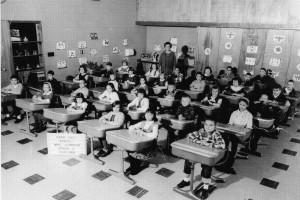In today’s education system, there seems to be a myriad of pedagogical methods, ideas, and tools, all claiming to be the cure to latest educational deficit and the future of education. In the midst of all the debate, there is usually a wise senior educator that says that this isn’t anything new; that student test scores are seemingly always on the decline or not meeting expectations; our education system always seems to be in a crisis. In this century old debate, there are two kinds of people debating on what to do; the progressive educators who blame the educational woes on the stubborn traditional model, and the traditionalists who fault the “shortcomings” on the fad-of-the-day progressive models.
What do I think? I am just a new teacher so I am none the wiser. It is easy for me to learn about these new and exciting pedagogies and think that I can jump on board with what seems to be the future of education and be a leader of change for the betterment of our youth. I must admit that these pedagogies are exciting and inspiring for me as a new teacher. I can be that progressive push of the next generation of teacher for my school district.
But after hearing arguments from both sides, I don’t know who’s right. I see merit in both sides of the coin. In my teacher training, I have been pushed to incorporate “student-centred learning” into my practice and use methods such as group work, ‘think-pair-shares,’ and other student-collaborative work. Further research has led me to believe in the popular progressive pedagogies that incorporate some variation of inquiry-based learning. All theory and research for progressive pedagogies have compelling arguments for how it benefits our students.
On the flip side, I have observed other teachers that practice the ‘stand and deliver’ instructional method with great success in student achievement and enjoyment. Why is it that this direct instructional model the most conventional? I have to believe that most teachers have their students best interests at heart. There is a lot of research that suggests that direct instruction is the most successful teaching model. Other publications have been made with supporting evidence stating that some progressive instructional techniques are ineffective. As a beginning teacher with no basis of any insight, it is difficult to choose a side.
So how will I orient my instruction in my future classroom? After having conflicting perspectives between the two general pedagogies, I have found peace in deciding to orient my teachings that differentiates student learning as much as I possibly capable. I believe that there is no single pedagogy that works for all students. There is no one-size-fits-all model. Teachers should not rely on just one approach. A good teacher uses everything possible to help reach every kid in the learning. With the instruction strategy brings an increased workload but I find that more comforting than not meeting the needs of al my students.
This practice is a big task and something that is not achieved overnight. I know I have a long journey ahead me, continuously improving on my practice, and never perfecting this noble profession of teaching.
Also see my post on discovery learning.



 Follow
Follow